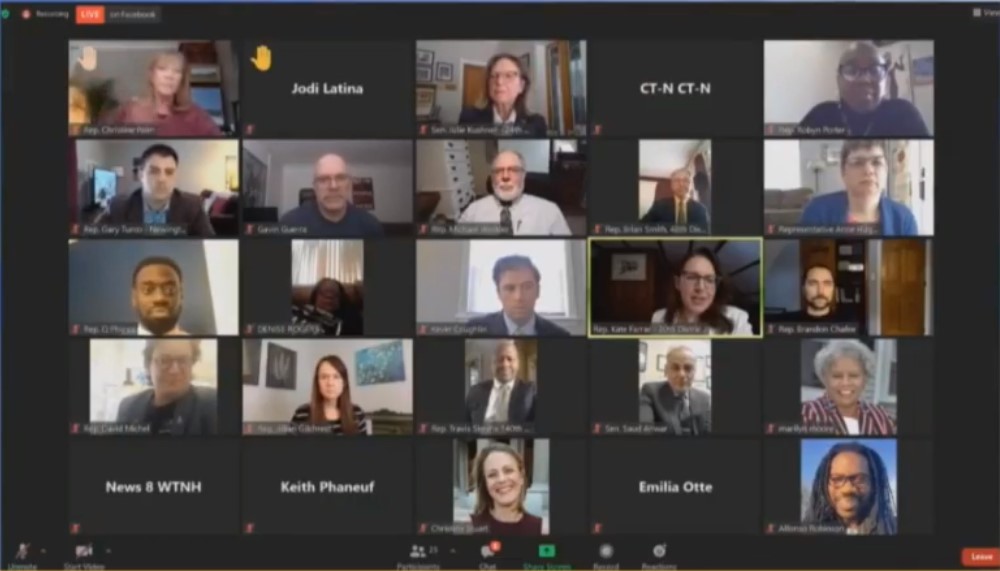A week ahead of Governor Lamont’s budget address, a group of thirty state legislators today announced their plan to help those who have been devastated by the pandemic and ensure a fair recovery for everyone in Connecticut.
“If this pandemic, which has cracked wide open every fissure in our systems, is not the rainy day that we have been waiting for, what is?” asked Rep. Christine Palm. “What is the calamity that will take the political will to do what is right for one another in a time that is so beyond imagining? If not now, when?”
Rep. Robyn Porter said that, though Connecticut is one of the richest states in the nation, we also have some of the worst inequality.
“We must lift from the bottom. When we lift from the bottom everyone is elevated. We know trickle down does not work,” she said. “Our people are desperate, they are traumatized, and they are counting on us to get this right—now.”
The legislators’ plan focuses on lowering the cost of health care, offering additional assistance to the unemployed, lowering the tax burden on the working and middle classes, and increasing funding for education.
Senator Julie Kushner said that she is particularly concerned about education. In Danbury, a town she represents, the student population has been growing, yet schools remain severely underfunded.
“Our goal is to help working- and middle-class families come out of this pandemic stronger and better,” she said.
The legislators’ plan includes $4 billion in revenue-raising options that would come from the wealthiest in the state as well as major corporations who pay a much smaller percentage in taxes than the state’s poorest residents.
“The most recent election showed people really want a different direction, they want fairness, they want equity,” said Rep. Quentin Phipps. “Now is the time for change—we’ve been talking about these issues for years.”
CEA President Jeff Leake said that educators appreciate that legislators are taking a stand.
“Teachers see every day the kind of dire circumstances their students and their students’ families are facing,” he said. “From hunger to job loss to illness and even loss of life, COVID-19 has devastated so many Connecticut residents. People are at a breaking point. We need a serious investment by state government to help those whom this pandemic has harmed the most.”
Joining legislators at today’s news conference were two of the many Connecticut residents who have had their lives severely disrupted by the pandemic.
Denise Rogers lost her husband to COVID in May of this past year, and she too was infected. She is still feeling the effects of COVID and experiences brain fog and fatigue—her doctors don’t know when she will completely recover.
Rogers contracted COVID while working as a bus driver, transporting medical staff at Yale New Haven Hospital. Despite contracting COVID on the job, she has had to fight to receive workers’ compensation.
“Please don’t forget us,” she implored state officials. “We’re out here, and we need your help.”
Weston resident Gavin Guerra is an independent filmmaker, a gig worker who only sometimes receives health insurance from his jobs. His eight-year-old autistic daughter suffers from Crohn’s disease, a medical condition that will require lifelong medical care.
When COVID became widespread in March, Guerra had just finished a job that did offer him health insurance, making him eligible for COBRA coverage when that job ended. Because of his daughter’s fragile medical condition, he did not want to start a new job where he could contract COVID and bring it home, jeopardizing his daughter’s health.
The only health insurance he is currently eligible for and that allows his daughter to access her New York doctors is costing the family more than $30,000 a year in premiums alone.
“I’m not a wealthy person,” Guerra says. “I’m just a concerned father—it’s not like I can do without health insurance and just hope we don’t get sick.”
He continued, “I really hope we can invest in other options for Connecticut and have options in our health insurance exchange that are truly affordable and offer real coverage.”
“The investments we’re highlighting today really can be the solution to the pain, the struggle, the challenges of not just Denise and Gavin, but to the struggles and challenges of mothers and fathers, sisters, brothers, friends and neighbors just like them,” said Rep. Kate Farrar. “We can make these funding investments if we create a state tax policy that does look toward the future and doesn’t just respond to emergencies.”







